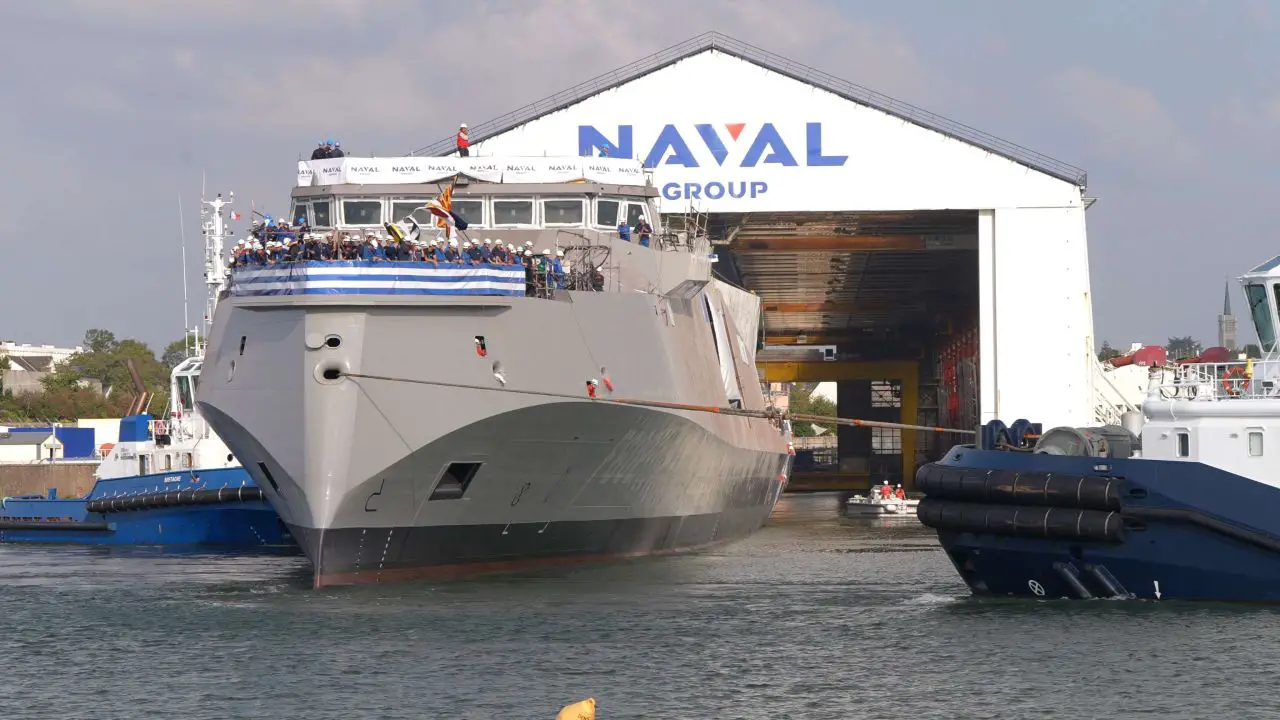The Hellenic Navy took another decisive step toward bolstering its maritime capabilities with the launching ceremony of the second FDI (Frégate de Défense et d’Intervention) frigate, Hellenic Ship (HS) Nearchos. The ceremony was held at the Naval Group shipyard in Lorient, France, and was attended by senior defense officials, marking a significant moment in the strategic partnership between France and Greece. The event brought together notable figures including Greece’s Minister of National Defence, Nikolaos Dendias, and General Gaël Diaz de Tuesta, Director of the International Direction of the French General Armament Directorate, representing the French Minister of Armed Forces, Sébastien Lecornu. Also present were General Dimitrios Choupis, Chief of the Hellenic National Defence General Staff (HNDGS), Vice Admiral Dimitrios E. Kataras, Chief of the Hellenic Navy General Staff (HNGS), and Major General Ioannis Bouras, the General Director of the Greek Defence Procurement Agency (GDDIA). This launch is the latest milestone in Greece’s ambitious naval modernization program, which aims to significantly enhance the Hellenic Navy’s operational readiness and defense capabilities in the volatile Eastern Mediterranean region. HS Nearchos now joins her sister ship, HS Kimon, which is undergoing harbor trials and is expected to commence sea trials soon. These new-generation frigates form the backbone of Greece’s naval fleet renewal, designed to safeguard national interests and maintain maritime superiority in the Mediterranean.
The FDI frigates project is not just a military venture; it is also a symbol of the robust and growing industrial cooperation between Greece and France. Over the years, Greece has increasingly integrated into the French defense supply chain, contributing to the production of critical systems and components for these warships. The HS Nearchos, like her sister ships, features various equipment produced in Greece by local manufacturers, a testament to the successful collaboration between the two nations. A key highlight of this cooperation is the production of major parts of the frigates in Greece. For instance, a critical component of the third frigate, HS Formion, was constructed at the Salamis Shipyards in Greece. This block, Section 8, represents the deepening integration of Greek industry into the Naval Group’s supply chain, further enhancing the strategic alignment between the two countries. The assembly of HS Formion’s hull was completed in August 2024, marking another key milestone for the Hellenic Navy’s new fleet, with all three frigates scheduled for delivery by 2026. This close industrial collaboration not only strengthens military ties but also delivers economic benefits to both nations, particularly in terms of technology transfer, job creation, and the development of a self-reliant defense industry in Greece. The long-term partnership between Naval Group and Greece will continue to evolve as the frigate program advances, reflecting the mutual trust and strategic goals shared by Athens and Paris.

Weighing in at 4,500 tons, HS Nearchos is a state-of-the-art frigate designed to fulfill multiple roles in naval combat, from anti-air warfare and anti-ship operations to anti-submarine warfare and special forces missions. The frigate’s versatility ensures that the Hellenic Navy can project power, protect its maritime interests, and respond swiftly to emerging threats in the Eastern Mediterranean and beyond. The FDI frigates are specifically tailored to meet the modern challenges faced by Greece, a nation that must constantly defend its extensive coastline and numerous islands in a region marked by territorial disputes, geopolitical tensions, and evolving security threats. Equipped with some of the most advanced radar, sonar, and electronic warfare systems available, HS Nearchos represents a significant leap forward in the Navy’s ability to detect, track, and neutralize potential threats.
Among its core capabilities, HS Nearchos excels in air defense, equipped with 32 Aster missiles developed by MBDA. These missiles are renowned for their ability to intercept a wide range of aerial threats, including hostile aircraft, drones, and even ballistic missiles. Complementing its air defense systems are eight Exocet MM40 B3C missiles, which provide formidable anti-ship capabilities, allowing the frigate to engage enemy vessels with precision at extended ranges. In terms of anti-submarine warfare, HS Nearchos boasts MU90 torpedoes developed by Naval Group, which are designed to counter the increasing submarine threat in the Mediterranean. These torpedoes, combined with the ship’s advanced sonar and acoustic systems, ensure that the frigate can detect and neutralize enemy submarines, safeguarding both itself and nearby naval assets.
Beyond its formidable missile and torpedo systems, HS Nearchos is outfitted with a range of high-tech features that make it a formidable player on the modern battlefield. The frigate’s aviation facilities include a helicopter deck capable of supporting a 10-ton class helicopter, as well as facilities for vertical take-off and landing unmanned aerial vehicles (VTOL UAVs). These UAVs extend the ship’s surveillance and reconnaissance capabilities, providing vital intelligence on enemy movements or potential threats long before they reach the ship. Additionally, the ship features a 76 mm main gun, designed for use against both surface and aerial threats. This highly accurate weapon allows the ship to engage smaller, fast-moving targets, such as patrol boats or low-flying drones, further enhancing its defensive capabilities. The ship also has four torpedo tubes, along with advanced countermeasures like the CANTO system developed by Naval Group, which helps to protect the vessel from enemy torpedoes by creating acoustic decoys. The FDI frigates benefit from the expertise of several of Europe’s leading defense contractors, including Naval Group and Thales. Thales, in particular, is responsible for the ship’s advanced radar and electronic warfare systems, which include long-range 3D radar capable of tracking multiple aerial and surface targets simultaneously. These systems enable the frigate to detect threats early and respond quickly, making it one of the most advanced warships in the Hellenic Navy’s fleet. Meanwhile, MBDA has equipped the frigate with its sophisticated missile systems, including the Aster and Exocet, ensuring that the ship is well-armed to deal with both aerial and surface threats. These companies have worked in close partnership with the Hellenic Navy to ensure that the frigates meet the specific operational needs of Greece, while also integrating seamlessly with the Navy’s existing fleet.
















